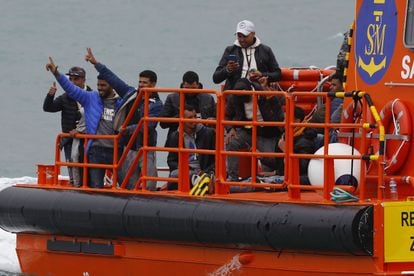Migrants rescued by Salvamento Marítimo on April 28 upon arrival in Gran Canaria. Elvira Urquijo A. (EFE)
The Ministry of the Interior has agreed with Morocco to reinforce joint maritime patrols to stop the arrival of small boats on Spanish coasts.
The agreement was reached this Friday in Rabat during the visit that representatives of the Interior, Migration and Foreign Affairs made to the Moroccan authorities in a meeting aimed at dealing with migration flows, according to delegation sources.
The agreement, first of all, means recovering these patrols that were suspended since the beginning of the pandemic.
According to the same sources, the new terms of cooperation, which have yet to be finalized, will increase the time that patrols spend at sea and will reinforce the number of agents involved.
The two countries have also agreed on a review of the areas in which they work to adapt or extend them to the regions with the greatest migratory pressure.
Until July, when it is intended to resume activity, a bilateral meeting is planned to define the new operating plan.
The joint patrols, formed by agents of the Civil Guard and the Royal Gendarmerie, were agreed in 2003 during the Government of José María Aznar and, according to Interior, since they began in 2004, "they have demonstrated their effectiveness in controlling migratory flows ”.
Their activity, in any case, was scarce and they were only deployed once a month: two civil guards accompanied the Moroccan officers in Morocco and two Moroccan agents acted in Spain.
The agents worked five days (three of effective action on the ground) and alternated land, air and sea surveillance to stop the departure of boats or intercept them on their way to Spanish coasts.
The objective now is that these guards are extended up to 10 days.
The areas of action are also of interest to Spain, which is considering modifying and expanding them, since the migratory routes have varied over the years and the greatest pressure is now placed on the Canary archipelago.
Until now, the Moroccans have patrolled the coast of El Aaiún, the capital of Western Sahara, and the Spanish, in the Canary Islands.
Also in Tangier and Algeciras, and in Nador and Almería.
"The objective is to resize its structure, reinforce its composition and vary the deployment areas to adapt to the changes that have occurred in the starting points of irregular immigration and in the routes to Spain," sources from the Spanish delegation summarize.
At the meeting in Rabat this Friday, the Spanish delegation also insisted on "continuing to improve" operations against irregular immigration networks.
A meeting is scheduled for the last week of May between members of the General Immigration and Borders Commission and Moroccan immigration and border agents to advance this cooperation, which has not always flowed as the Spanish authorities would like.
Police cooperation with Morocco has a budget of 30 million euros which finances material, vehicles and allowances for Moroccan agents to control irregular immigration.
The visit of the Spanish delegation to Rabat, within the framework of the Hispanic-Moroccan Permanent Group on Migration, took place after the renewal of relations between the two countries thanks to Spanish support for the autonomy of Western Sahara under Moroccan sovereignty.
But also after learning that the mobile phones of President Pedro Sánchez and Defense Minister Margarita Robles were seized by Pegasus
software
, a program that in theory only governments can acquire and that allows you to activate the cameras and microphones of phones, download data and intercept communications.
The National Intelligence Center (CNI) has also found traces of the Pegasus spy program on the cell phone of the Minister of the Interior, Fernando Grande-Marlaska.
The intrusions occurred in May and June 2021. In those months the Government was facing two critical moments: the granting of pardons to prisoners of the
procés
and the aggravation of
the crisis with Morocco due to the massive entry of 10,000 people into Ceuta.
This latest episode, added to the journalistic revelation in July last year that pointed to Rabat as the alleged author of thousands of wiretaps on Algerian and French telephones, including that of President Emmanuel Macron, have multiplied speculation about Rabat's possible participation in the Spanish case.
Exclusive content for subscribers
read without limits
subscribe
I'm already a subscriber

